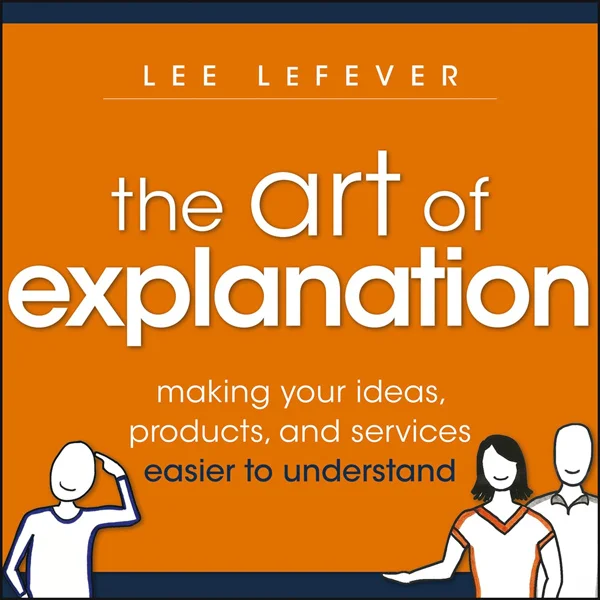
Impossible? Absolutely not, because I've prepared for you 5 key takeaways from Lee LeFever Lee's book "The Art of Explanation: Making your Ideas, Products, and Services Easier to Understand"
1. Explanation and running - what do they have in common?
"What does running have to do with it?" - you ask. Answer. The author of the book - Lee LeFever - pointed out that running is not just a mechanical movement of the legs, but a whole science where you need to be able to control your breathing, heart rate and foot placement. The explanation is made up of details too, so don't devalue the simple things, they will help you learn new skills.
2. Creating a good explanation is impossible without the ability to distance yourself from your own perceptions and side with the listener
You know the expression "the curse of knowledge"? That's when you're an expert on a topic and you're trying to explain something in complicated terms to your interlocutor, and he or she thinks, "Umm. I think that's in Elvish." In other words, what you know like the back of your hand, the interlocutor may be hearing for the first time. So try to put yourself in his shoes and explain in understandable words, on your fingers. You need to be able to do it simply.
3. Explanation as an answer to the question "Why do I need this?"
Think back to a boring lecture at university or school, where it was hard not to fall asleep. It was because your brain did not want to perceive this information and resisted as much as it could. And then why would the interlocutor listen to your explanation? If a reason is found, the thread of attention will definitely not be lost. So try to answer the question "Why?" for the listener. And the more often you do it, the better.
4. Context + history + sustainable connections = success
Context. You know the phrase "Forest and trees are different"? If you want to convey something, you need to start with the general (forest), not the specifics and details (trees), delving into the topic gradually. That way the person you're talking to will understand you.
Story. With the help of this tool you can really quickly convey some essence. Tell a story that is related to the topic of the explanation. It is desirable that it was about someone you know. So the chance of success is much higher. By the way, there's a useful conclusion about storytelling skill here too, check it out.
Stable connections. Yes, this factor can also be used in an explanation. This is where analogies are needed. For example, to explain what a trolley bus is, you could say it's a bus with horns. Simple and straightforward, right?
Don't forget these components, they will definitely help you.
5. It is important to realize whether the person in front of you is knowledgeable or not
A is a person who doesn't understand anything about some issue, and Z is an expert. So, the first category when explaining needs to answer the question "Why?" and the second category needs to answer the question "How?".
Difficult? Let's use an example. Imagine you've written a book. You need to explain to some people why they should read it at all, and to others how they can benefit from your book. That's why it's important to understand whether the person you're talking to is on topic or not.
Instruction for problem solving
This is a kind of formula from the book "The Art of Explaining" in which you can substitute the name of someone you know, describe their problem, pick a couple of solutions, and encourage them to take action. Read in order:
Meet Bob. He has a problem and is desperate (Beginning of the story)
He finds a solution and tries it (The Plot)
Now he's happy.
Don't you want to feel like Bob? (Motivation)
This guide is designed to help you or your loved one figure out how to deal with the difficulties you or your loved one is facing. Be sure to try it out and post in the comments of this article how effective it is. I hope you find it helpful.
Easy assignment:
Write these conclusions down in your notebook, and then try to apply one or more of them in your daily life. Write about it in the comments, many people will be interested in your experience
Why?
It will move you forward. If you move forward and implement the important, in your opinion, conclusions from the books, then in a couple of months you simply will not recognize yourself. And if you've been with me for a while, share your experience in the comments with those who are just getting on the path of self-development.
This was a review of LeFevere Lee's book "The Art of Explanation: Making your Ideas, Products, and Services Easier to Understand".